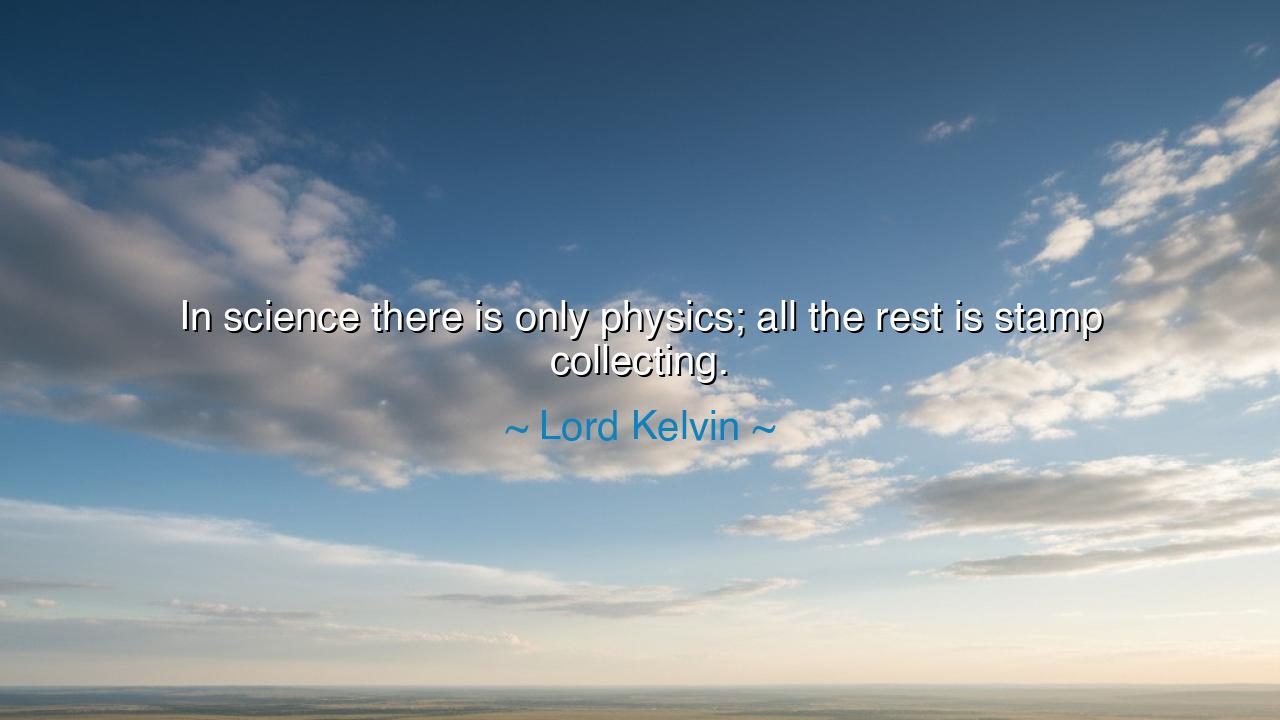
In science there is only physics; all the rest is stamp






"In science there is only physics; all the rest is stamp collecting." These words, spoken by the brilliant Lord Kelvin, ignite a deep reflection on the true nature of science and the path it must follow. In this statement, Kelvin is not belittling the pursuit of knowledge in other fields, but rather asserting that physics—the study of the fundamental forces and laws that govern the universe—is the cornerstone upon which all other sciences must stand. He points to physics as the root of all understanding, suggesting that to truly comprehend the natural world, we must look not at isolated facts or curiosities, but at the unifying principles that bind everything together.
In the ancient world, the search for universal truths was the driving force behind the study of nature. Pythagoras sought the mathematical principles behind the cosmos, believing that all things could be understood through numbers and harmony. Similarly, Aristotle sought to catalog the natural world, aiming to classify and understand the properties of everything in nature. But even in his time, there was an understanding that the true essence of knowledge lay not in the mere accumulation of facts, but in discovering the underlying laws that connect them. Aristotle’s works, though revolutionary in their time, were only the beginning—science, he knew, had to evolve into something more unified, more profound, something that could explain the interconnectedness of all things.
Kelvin’s words, then, are a continuation of this ancient quest. In his view, physics is the ultimate science, for it is the study of forces, energy, and matter—the very foundation upon which the structure of the universe is built. The other fields of study, while important, are, in a sense, mere observations and classifications—valuable in their own right, but incomplete without the fundamental understanding that physics provides. Biology, chemistry, and astronomy—though remarkable in their ability to describe life, matter, and the stars—are incomplete without the fundamental laws that underlie them. They are, as Kelvin puts it, like stamp collecting, cataloging pieces without understanding the deeper mechanisms that bind them.
Consider the example of Isaac Newton, whose work in physics unified centuries of observations and laid the foundation for our understanding of the universe. Newton’s Laws of Motion and his theory of universal gravitation provided a framework that made sense of the movements of the stars, the fall of an apple, and the tides of the oceans. His insights transcended the narrow confines of individual scientific fields, showing that all things in the physical world are connected by the same principles. Newton’s physics wasn’t simply a catalog of observations; it was a unifying theory, a deeper understanding of the forces that governed nature. His work demonstrated that in order to truly understand the world, one must look for the fundamental laws that govern its existence.
Kelvin’s words also bring to mind the scientific revolution of the 17th century, which was rooted in the work of Galileo, Kepler, and Descartes, among others. These pioneers of science saw beyond the surface of observable phenomena, seeking to discover the mathematical and physical principles that underpinned the movements of the heavens and the nature of terrestrial existence. They were not merely interested in cataloging stars or collecting data; they were searching for the deeper truths that governed the natural world. Galileo, with his telescope, and Kepler, with his laws of planetary motion, were united by a desire to understand the fundamental forces at play in the universe.
Yet Kelvin’s statement is not just a reflection of the past, but a challenge to our present and future. Science, he implies, is not about amassing facts for the sake of trivia. It is about seeking unity in the diversity of the world around us. It is about understanding that all knowledge, whether in chemistry, biology, or medicine, must be built upon the foundation of physics—the study of the laws of nature that govern the most fundamental aspects of life and the universe. Just as the ancients sought the unifying principles of the cosmos, so too must we, today, seek a deeper understanding of the forces that shape our world, not through fragmented observations, but through a holistic approach to science.
In your own life, consider how you approach knowledge and understanding. Do you, like a stamp collector, gather pieces of information without seeking to understand how they fit into the greater tapestry of truth? Or do you, like the great thinkers of history, seek the deeper connections, the underlying principles that bind all knowledge together? Physics, in its broadest sense, invites us to look beyond surface details and to seek the unifying laws that govern everything from the smallest particles to the vastness of the stars. Whether in science, art, or philosophy, the greatest discoveries come not from the accumulation of facts, but from the search for the universal truths that transcend individual disciplines.
The lesson from Kelvin’s words is this: seek the principles, not just the pieces. In every aspect of your life, aim for a deeper understanding of the forces that shape the world and guide your actions. As you seek knowledge, whether in science, relationships, or personal growth, remember that the most profound truths are those that connect everything—those that transcend the surface and reveal the deeper laws that govern all things. Seek not just to collect facts, but to understand the unified forces that lie behind them. In doing so, you will find not only the answers to your questions, but a deeper sense of meaning in the world around you.






AAdministratorAdministrator
Welcome, honored guests. Please leave a comment, we will respond soon